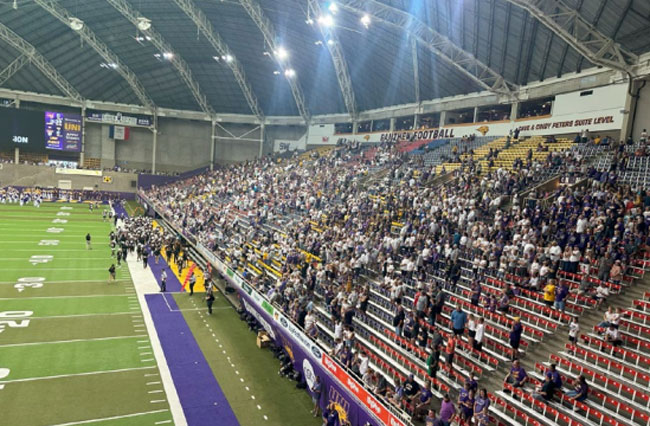(Radio Iowa) – The first phase of a plan to modernize the 48-year-old UNI-Dome in Cedar Falls was completed last month and the board that governs the University of Northern Iowa has approved moving ahead with the second phase of the project.
“A project that will significantly transform the look and experience of one of the most iconic buildings in the state,” Michael Hager, University of Northern Iowa senior vice president for finance and operations, told the Iowa Board of Regents Property and Facilities Committee this week.
The UNI-Dome hosts the high school football championships and hosts UNI football games. The dome has been updated, with a new Teflon-coated fiberglass roof. “Everything is tight and dry now,” Hager said, “and we can move on to Phase II.”

Upgrades to the UNI-Dome will include wider seats. (UNI photo)
UNI officials say the $16 million dollar for the second phase of the project is focused on the fan experience. “Phase II will be one of the more visible phases, one of the more exciting phases. It will include restroom additions and for the record, we are adding two women’s restrooms for every male restroom,” Hager said. “…I have personal experience living with one of those women that will be very pleased to see more restrooms in that facility.”
The aisles in seating areas will be widened and handrails will be added. Seating capacity will drop from about 16,000 to around 12,000 for sporting events Hager said that’s due to wider aisles and the removal of some seating to expand loge boxes, plus each seat will be wider.
“All the seats are currently 18 inches in there. They will move up to at least 20 inches. Apparently over the last few decades people have gotten a little wider,” Hager said. “And then in the loge boxes, the seats will be closer to 22 or 24 inches then as well.”
The upgrades to seating will have a positive financial impact, according to Hager. “By having a lack of premium seating, we’ve missed out on a revenue stream there and then just having the outdated facilities we haven’t sold as many tickets as what we think we will sell,” Hager said. “We’re more likely to have events that are closer to capacity and that just makes for a more robust event than one that has a lot of empty seats.”
There were 25,000 people at the Fleetwood Mac concert in the UNI-Dome back in 1989, but Hager said given changes in the music industry the UNI-Dome is likely not a big enough arena to attract major acts.









